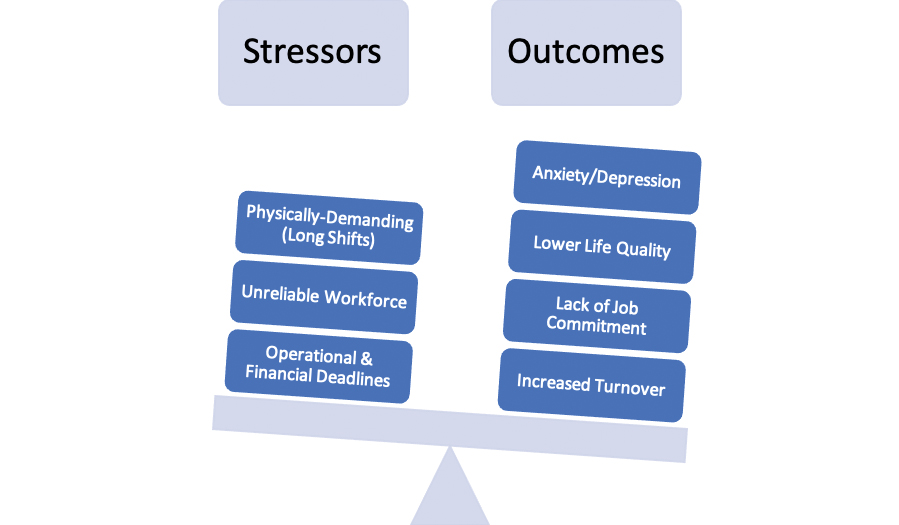by Hicham Jaddoud
Workplace stress has become an important topic in research because of its crucial significance to gaming employees and organizations. Despite the relative lack of practitioner research regarding the impact of managerial stress in casinos, the informal outreach across casino properties reveals that most casinos share similar concerns about the level of stress that managers express when working in gaming operations.
Due to the demanding nature of the industry, working in a casino setting impacts the stress level and well-being of management staff. Managers in the gaming industry face different types of stressors, such as organizational structure, deadlines, demanding guests, and/or an unreliable workforce. The stress levels of management in casinos appear to be particularly critical. Compared to line employees, managers may experience more work-related stressors because of their higher levels of operational, financial, and legal responsibilities. Managers reported stress when their departments are experiencing staff shortage (either as a result of voluntary or involuntary employee separations). This means that managers are required to work longer hours, worry about staffing levels during other shifts, and maintain service standards.
Managers in gaming have been reminded, in theory, that “stress is a formidable threat to their success” – when stress gets out of control, the brain and performance suffer. Management is constantly pushed to meet deadlines and monitor operational expenses while engaging frontline teams. These requirements raise important concerns for gaming organizations. The results suggest that managers’ health care costs could be high in concert with stress being high. Therefore, the importance of a sense of well-being in the work setting should not be taken lightly. Most of management staff spend a considerable fraction of their lifetime at the workplace, and what happens there trickles down into the rest of their lives.
The significance of workplace stress likely means managers in the gaming industry have lower quality of life and are often in work situations that place unusual strain on them, that eventually affect their well-being and emotional health. Organizational behavior research concludes that stress in the workplace is the cause of both physical (headaches, stomach problems, and even heart attacks) and mental (social anxiety and depression) dysfunctions. Furthermore, it can be argued that managerial stress in casinos may lead to reduced job satisfaction, lower organizational engagement, and burnout.
Another indicator of managerial stress is the size of the teams managed. The more staff a manager oversaw, the more stressed he/she felt at work. This conclusion is compounded by the labor-intensive nature of the gaming and hospitality sectors.

Field observations validate that when stress levels are uncontrollable in the workplace, managers tend to build organizational habits that are mainly focused on behavioral patterns that reduce productivity, enhance conflict, and lead to withdrawal behaviors. Managers may even resort to “intentional forgetting” approach as a method to “escape” dealing with challenging emotional situations at work and suppressing unpleasant feelings and thoughts.
Arguably, managers in gaming (and hospitality) may experience greater stress and career interference with their personal lives when compared with managers in other industries. The graph above demonstrates the most reported stressors and their outcomes on the well-being of managers.
In most service industries, mainly gaming and hospitality, managerial stress may also come from working long hours, including weekends and holidays, dealing with internal conflicts, low pay, status, and promotability (upward mobility).
With diverse backgrounds and experiences, managers differ in how they approach stressful situations depending on their experience and mindset. Fundamentally, individuals with a more positive stress mindset consider stressful situations at work as an opportunity to achieve enhancing outcomes. Whereas individuals with a more negative stress mindset approach a stressful situation with motivation to withdraw and avoid potential negative consequences.
Developing workplace stress-coping mechanisms have the potential of alleviating organizational withdrawal behaviors such as turnover, lateness, and absenteeism. This conclusion is supported by The Brief COPE framework that measures behaviors and cognitive activities one might engage in to cope with stress. This includes planning, acceptance, emotional support, behavioral disengagement, and denial. Subsequently, when faced with a challenging work experience, managers who reflect constructively on a specific stressful occurrence to gain a better understanding of it would be more likely to effectively cope. Conversely, those who do not constructively attempt to understand challenging experiences may be less likely to cope and will develop avoidance coping approaches.
Employers’ efforts to help managers control stress and improve their emotional health must go beyond the formal on-the-job-training. Gaming firms must recognize the work-life balance and help managers uncover and address the causes of stress in their lives. Identifying the causes of stress is the first step in reducing its negative impact. While there may be several events that cause managerial stress in the work environment, these factors may change over time.
Managerial stress research suffers from lack of actual involvement of all stakeholders. It is necessary to go beyond academic discussion, implementing stronger practical implications as well as devoting more efforts to intervention stress-coping programs and psychotherapies aimed at controlling a person’s level of stress in a work setting. When academics, industry practitioners, and health care professionals work together, it may be possible to minimize the consequences of managerial stress in the work environment and help alleviate stressful encounters.
Hospitality colleges, trade schools and industry groups have a real interest in ensuring they are teaching concrete techniques to deal with organizational stress. School curriculums not only need to bridge the gap between the classroom and the practical world, but also educate managers on how to apply new methodologies in managing employees with different preferences, demographics, and psychographics. These initiatives will increase the managers’ skillsets and keep new hires from bailing from lower-level positions to pursue other industries.
Another approach the gaming sector can adopt is to reduce stress and strain levels – referred to as the “realistic job preview.” This approach may be effective with both middle and upper management. This model is applied to applicants during the selection process and is based on the premise that potential managers given a more realistic view of the actual job prior to entering the workforce will be less likely to harbor unrealistic expectations.
Additionally, along with reviewing the wages, gaming enterprises may need to offer improved benefit packages. Total compensation packages may not be limited to health care benefits and paid time off, but can be extended to saving plans, travel discounts, transportation, childcare, discounted or free meals at work, social and supportive culture, wellness programs, life-skills training, and tuition assistance. In addition, management must provide a career development path to middle managers to promote the gaming sector as a career worthwhile pursuing, rather than just a paycheck.
The goal is to improve the gaming managers’ life satisfaction including the implementation of fundamental changes in scheduling, development programs, and building internal support mechanisms. The staffing landscape is evolving. Employers must focus on meeting the needs of their present and future managers to reduce managerial stress and pressure.
In a market with dense gaming operations, one of the least expensive ways to reduce employee stress is through improving the workplace environment. Also consider off-the-job team building, scavenger hunts, employee picnics, industry Olympics, and forming sport team leagues – just a few examples of the possibilities.
A different approach that gaming recruiters would take to minimize stress is to start by identifying managers who best fit the existing working team (based on organizational culture), then identify the right position for them to fill.
As casinos and other gaming facilities continue to struggle with finding reliable managers to meet the demand, flexible schedules, parental leave, and childcare options become more attractive alternatives to workers. These options may contribute to retention and enhance a manager’s commitment.
Dr. Hicham Jaddoud is Senior Director of Hospitality at North Star Mohican Casino Resort and Hospitality Revenue Management Courses Facilitator at Cornell University. He can be reached by calling (314) 436-4863 or email [email protected].















































